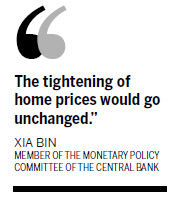Top News
Slowdown 'may add' uncertainty
By Wang XiaoTian and Xin Zhiming (China Daily)
Updated: 2010-09-13 10:42
 |
Large Medium Small |
BEIJING - A slowdown in the country's economic growth in the second quarter may add more uncertainty to policymaking, but policies would only be fine-tuned if any changes are made, Chinese economists have said.
China's gross domestic product (GDP) expanded by an impressive 11.1 percent year-on-year in the first six months, the National Bureau of Statistics (NBS) said on Thursday, but its growth eased to 10.3 percent in the second quarter from 11.9 percent in the first.
"We need to wait for the third-quarter statistics to make a judgment, but for now, there would not be any major policy changes," said Jia Kang, director of the research institute for fiscal science under the Ministry of Finance, last week.
The monetary policy, for example, has been made more flexible compared with previous months, he said.

The economic slowdown has been "in part because of the slowdown in investment led by the winding down of the massive stimulus initiated last year", said Louis Kuijs, economist of the World Bank China Office in an earlier interview.
China's economic slowdown is attributable to its tightening of the real estate sector and the control of credit as policymakers were worried about economic overheating early this year, analysts said. The weakening trend will continue, they said.
"The tightening of home prices would go unchanged," said Xia Bin, economist and member of the monetary policy committee of the central bank, said last week. "People should not be misled by the recent rise in transactions; it's temporary," he told reporters.
China's economic growth could slow to 8 percent in the fourth quarter, said Xia.
"It could be about 10 percent for the whole year", which is still well above the government target of 8 percent for GDP growth this year, Wang Tao, head of China research at UBS Securities, said.
The market has anticipated new stimulus measures from the government as economic growth slows, but economists said the possibility is slim although adjustments need to be made.
Dong Xian'an, chief macroeconomic analyst of Industrial Securities, said policies must now be targeted at stimulating domestic demand as the country restructures its economy.
"Domestic demand seems to have hit the trough," he said.
"We continue to see a policy-driven soft landing in China and believe policy flexibility will support growth if the slowdown turns out to be sharper than policymakers expect or target," said Barclays Capital in a research note.




